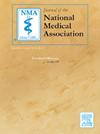Try not to think about food: An association between fasting, binge eating and food cravings
IF 2.3
4区 医学
Q1 MEDICINE, GENERAL & INTERNAL
引用次数: 0
Abstract
Background
When individuals follow a diet or limit their food intake, they activate cognitive restraint, which is defined as a mental effort to restrict dietary behavior with the goal of losing weight. As an example, fasting has also been associated with the recruitment of cognitive restraint, but further research is needed to fully understand its underlying mechanisms.
Aims
The aim of this study was to examine the relationship between the duration of fasting and disordered eating, such as food cravings, binge eating, and potential changes in eating habits.
Methods
An online survey was conducted among 853 first-semester university students to investigate their fasting practices and frequency over a three-month period prior to data collection. Participants who were on diets were excluded (n=214). After controlling the sample for biases, a comparison was made between 89 fasters and 369 non-fasters. The study compared levels of cognitive restraint, binge eating, food cravings, and consumption of ‘forbidden’ foods. A Poisson model was used to examine the association between hours of fasting and disordered eating traits. In the context of this study, the rate ratio was used to examine the relationship between fasting hours and disordered eating characteristics, such as binge eating and food cravings.
Results
The study found that fasters experienced an increase in food cravings and binge eating. However, fasters consumed fewer bread slices than non-fasters. The rate ratio of fasting hours practiced is 115% higher among binge eaters (RR 2.15; CI95% 1.70-2.73) compared to those who did not binge. The rate ratio of fasting hours is 29% higher in participants with moderate binge eating (RR 1.29; CI95% 1.05-1.59), increasing to 140% (RR 2.40; CI95% 1.86-3.11) in people with severe binge eating. As for food cravings (state), the rate ratio was 2% higher (RR 1.02; CI 95% 1.01-1.03) for each increase in the unit of the scale.
Conclusions
Our study has indicated that fasting is positively associated with increased levels of binge eating and food cravings.
尽量不去想食物禁食、暴饮暴食和食物渴望之间的关联。
背景:当人们节食或限制食物摄入量时,他们会启动认知克制,认知克制被定义为以减肥为目标而限制饮食行为的一种心理努力。目的:本研究旨在探讨禁食持续时间与食物渴望、暴饮暴食等饮食紊乱以及饮食习惯潜在变化之间的关系:方法: 我们对 853 名大学一年级学生进行了在线调查,以了解他们在数据收集前三个月内的禁食习惯和频率。正在节食的参与者被排除在外(n=214)。在控制样本偏差后,对 89 名禁食者和 369 名非禁食者进行了比较。研究比较了认知克制、暴饮暴食、食物渴望和食用 "禁忌 "食物的水平。研究采用泊松模型来检验禁食时间与饮食失调特征之间的关联。在本研究中,比率比被用来研究禁食时间与暴食和食物渴望等饮食失调特征之间的关系:研究发现,禁食者对食物的渴望和暴饮暴食的情况有所增加。然而,禁食者比不禁食者吃的面包片要少。与不暴饮暴食者相比,暴饮暴食者的禁食时数比率高出115%(RR为2.15;CI95%为1.70-2.73)。中度暴食者的禁食时间比率高出29%(RR 1.29;CI95% 1.05-1.59),而重度暴食者的禁食时间比率则增加到140%(RR 2.40;CI95% 1.86-3.11)。至于对食物的渴望(状态),量表单位每增加一个,比率比就增加2%(RR 1.02;CI 95% 1.01-1.03):我们的研究表明,禁食与暴食和食物渴望程度的增加呈正相关。
本文章由计算机程序翻译,如有差异,请以英文原文为准。
求助全文
约1分钟内获得全文
求助全文
来源期刊
CiteScore
4.80
自引率
3.00%
发文量
139
审稿时长
98 days
期刊介绍:
Journal of the National Medical Association, the official journal of the National Medical Association, is a peer-reviewed publication whose purpose is to address medical care disparities of persons of African descent.
The Journal of the National Medical Association is focused on specialized clinical research activities related to the health problems of African Americans and other minority groups. Special emphasis is placed on the application of medical science to improve the healthcare of underserved populations both in the United States and abroad. The Journal has the following objectives: (1) to expand the base of original peer-reviewed literature and the quality of that research on the topic of minority health; (2) to provide greater dissemination of this research; (3) to offer appropriate and timely recognition of the significant contributions of physicians who serve these populations; and (4) to promote engagement by member and non-member physicians in the overall goals and objectives of the National Medical Association.

 求助内容:
求助内容: 应助结果提醒方式:
应助结果提醒方式:


